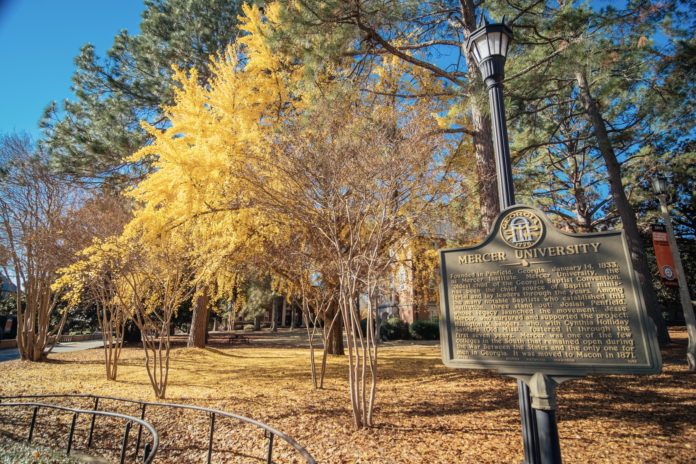ATLANTA — The Georgia Research Alliance has funded a new collaborative research project, led by Mercer University professor Dr. Martin D’Souza, to explore using nanotechnology to deliver a pneumonia vaccine. Dr. D’Souza, professor in the College of Pharmacy and Health Sciences, will collaborate on the $100,000 grant with researchers from Emory University and the Centers for Disease Control and Prevention.
Dr. D’Souza is director of Mercer’s Center for Drug Delivery Research and will partner on the grant with Emory’s Dr. Nadine Rhouphael and the Centers for Disease Control and Prevention’s Dr. Gowrisankar Rajam, Dr. Edwin Ades, Dr. Sandra Romero-Steiner, Dr. Jacquelyn Sampson and Dr. George Carlone.
“We’re very pleased that Dr. D’Souza’s research has garnered the attention of such a prestigious grant program and it serves as a testament to the high-quality research we’re doing here at the College and at Mercer,” said Dr. Hewitt W. “Ted” Matthews, dean of the College of Pharmacy and Health Sciences. “Of the 36 proposals submitted from institutions in the state, to be one of only 14 selected is quite an honor. In addition, Dr. D’Souza’s proposal was funded at the maximum level allowed under the grant program and is indicative of the promise of his research.“
The research will focus on developing a vaccine for streptococcus pneumonia, a respiratory pathogen that claims a large number of lives in young children and the elderly in the United States. The disease effects people of all ages around the world and is often fatal among the elderly and the very young. Mercer’s patented nanotechnology, which can deliver micro doses of vaccines, has proven to provide a more effective immune response than traditional injected vaccines in several other formulations. The grant will be used to do the initial testing of whether this nanotechnology can be applied to create a nasal vaccine for the streptococcus pneumonia virus that is more effective than the current injected vaccines.
The grant is part of the Alliance’s Next-Generation Vaccines and Therapeutics Initiative, which funds collaborative planning grants for projects among the eight universities in the state doing significant research, including Mercer. The program supports joint university-based research and development projects related to next-generation vaccines and therapeutics that have the potential to attract significant non-state funding. The goal of the program is to attract national research and development centers and other high-level research and development awards to make Georgia a destination in the area of next-generation vaccines and therapeutics. The program aims to create long-term, productive research and development partnerships among researchers in Georgia and develop new technologies that will accelerate the growth of the life sciences industry in the state.
This is the second award for Dr. D’Souza from the Georgia Research Alliance, which also awarded a grant in 2008 along with fellow College of Pharmacy and Health Sciences faculty member Dr. Ravi Palaniappan.
About the Georgia Research Alliance
A model public-private partnership between Georgia research universities, business and state government, the Georgia Research Alliance helps build Georgia’s technology-rich economy in three major ways: through attracting Eminent Scholars to Georgia’s research universities; through helping create centers of research excellence and through converting research into products, services and jobs that drive the economy. To learn more about GRA, visit www.gra.org.
About the College of Pharmacy and Health Sciences at Mercer University
Founded in 1903, the independent pharmacy school merged with Mercer University in 1959. In a bold leadership move, it became the first school in the Southeast to offer the doctor of pharmacy degree as its sole professional degree in 1981. In addition to the Doctor of Pharmacy degree, the college has one of the largest concentrations of Ph.D. students in pharmaceutics among colleges of pharmacy in the United States. In 2008, the college introduced a Physician Assistant program.
About Mercer University
Founded in 1833, Mercer University is a dynamic and comprehensive center of undergraduate, graduate and professional education. The University has approximately 7,600 students; 11 schools and colleges – liberal arts, law, pharmacy, medicine, business, engineering, education, theology, music, nursing and continuing and professional studies; major campuses in Macon, Atlanta and Savannah; three regional academic centers across the state; a university press; two teaching hospitals — Memorial University Medical Center and the Medical Center of Central Georgia; educational partnerships with Warner Robins Air Logistics Center in Warner Robins and Piedmont Healthcare in Atlanta; an engineering research center in Warner Robins; a performing arts center in Macon; and a NCAA Division I athletic program. For more information, visit www.mercer.edu.
— 30 —










